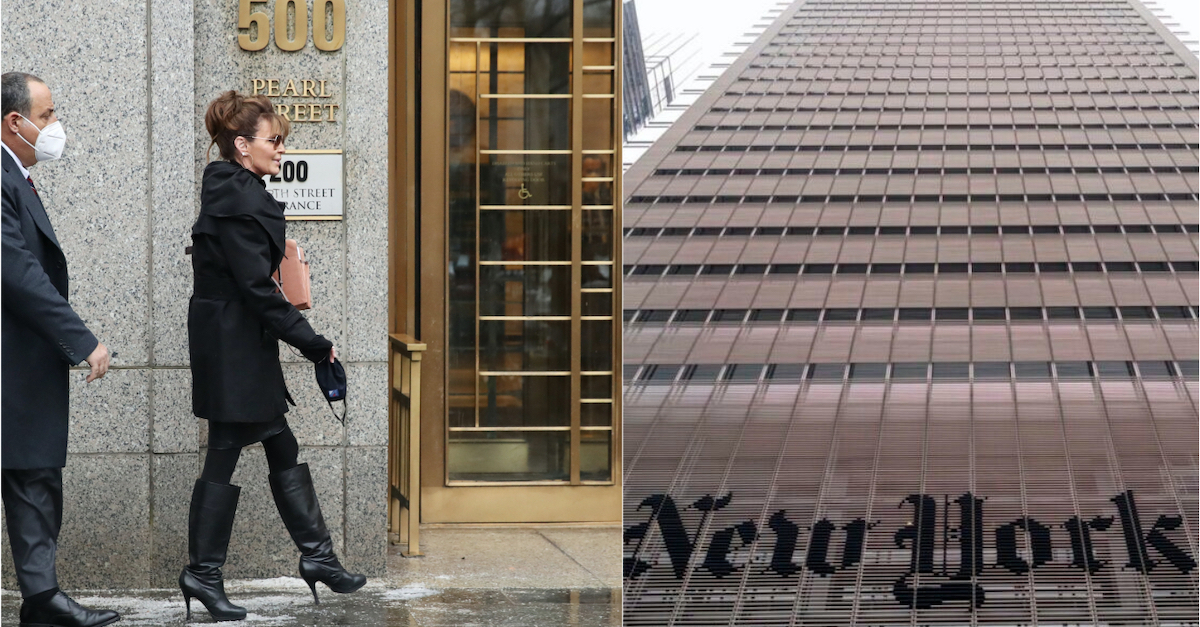
On the left, ex-Alaska Gov. Sarah Palin (R) enters into a Manhattan federal courthouse at 500 Pearl Street, where her lawsuit against the New York Times is taking place. The newspaper’s headquarters is on the right.
Former Alaska Gov. Sarah Palin’s (R) motion for both a new defamation trial against The New York Times and for the trial judge’s recusal was “wholly lacking in merit,” a federal judge found.
“Whatever she may have claimed in her complaint and pre-trial submissions, Palin was unable to deliver at trial admissible evidence that remotely supported her claim that she was intentionally or recklessly defamed by the defendants,” Senior U.S. District Judge Jed Rakoff wrote in a 30-page opinion and order on Tuesday.
Palin claimed that the 2017 editorial “America’s Lethal Politics” defamed her by tying her to a deadly mass shooting some six years earlier.
Before it was corrected, then-Times editor James Bennet wrote that the “link to political incitement was clear” when Jared Lee Loughner opened fire more than a decade ago in Tucson, Arizona, killing six people and injuring 13, including Rep. Gabrielle Giffords. The editorial board had been referring to a map disseminated by Palin’s political action committee Sarah PAC, which had stylized crosshairs over the electoral districts of Giffords and 19 other Democrats.
Trial demonstrated that the language sparked instant social media backlash. Bennet received emails from other members of the Times editorial board alerting him that no link was ever established.
Within hours, the Times revised the editorial with a correction.
That set of facts does not rise to actual malice, Rakoff said.
“Among other things, in the end she offered no affirmative evidence that Bennet or others who worked on the editorial that is the subject of her claim knew or suspected before publication that the challenged statements, which linked Palin’s crosshairs map to the Arizona shootings of Representative Gabby Giffords and others, were false,” the ruling states. “Indeed, none of the sources or research upon which the editorial board relied to draft, revise, and publish the July 14, 2017 editorial expressly denied Bennet’s inference that Palin’s Crosshairs Map had played a causal role in the Arizona shooting. And when cautionary information was brought to defendants’ attention, the Times promptly retracted the challenged statements. No reasonable juror could therefore have found by clear and convincing evidence that Bennet and the Times published the challenged statements with actual malice.”
READ RELATED: The Untold Truth Of The Man Who Sold The Eiffel Tower
Rakoff, a Bill Clinton appointee, tossed Palin’s defamation case before the jury similarly found the Times not liable. It later emerged that certain jurors received push alerts on their smartphones.
In the end, Rakoff found, that did not matter or compromise his impartiality.
“Palin’s only even arguably legally cognizable complaint concerns the Court’s decision to provide a brief post-verdict comment to a Bloomberg reporter’s ‘urgent’ request,” Rakoff said, adding that complaint is “without legal merit, let alone any evidence of bias.”
Rakoff notes that his comment to the publication followed the verdict and did not comment on the merits.
Palin’s attorney Shane Vogt did not immediately respond to Law&Crime’s email requesting comment.
Read the ruling here:
(Photo of Palin via Spencer Platt/Getty Images; photo of NYT building via JOHANNES EISELE/AFP via Getty Images)
Have a tip we should know? [email protected]
Source:




